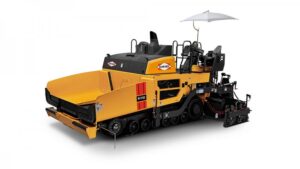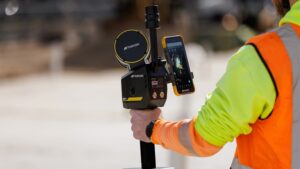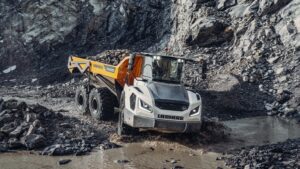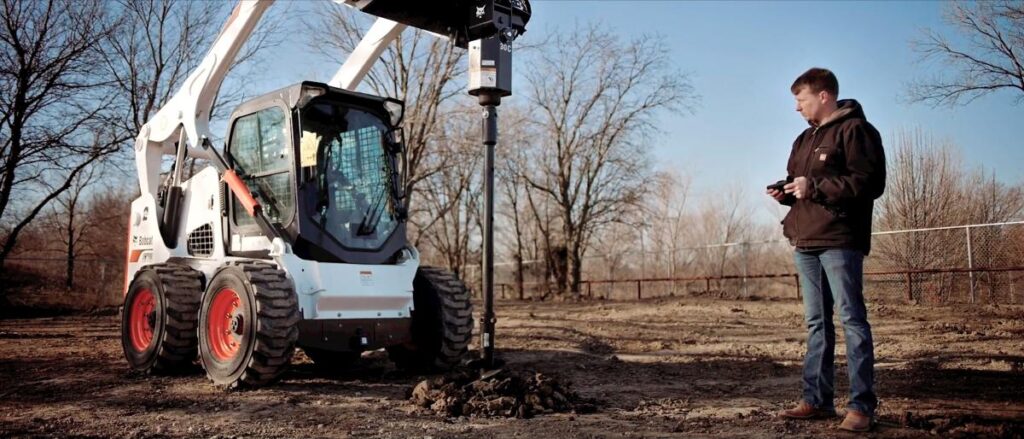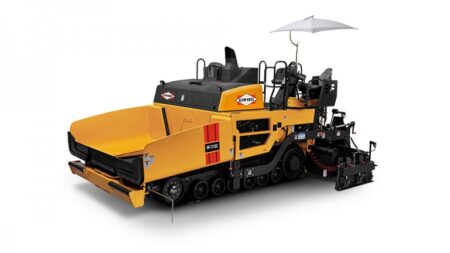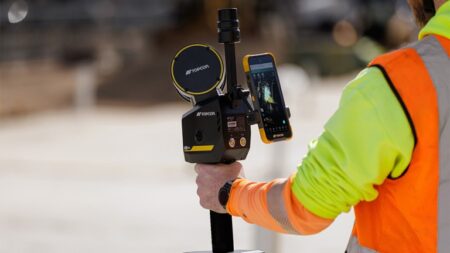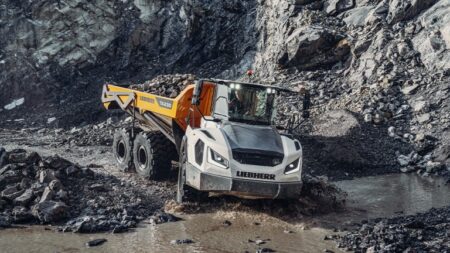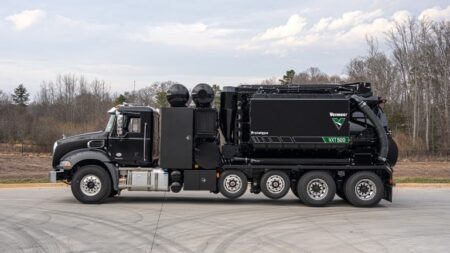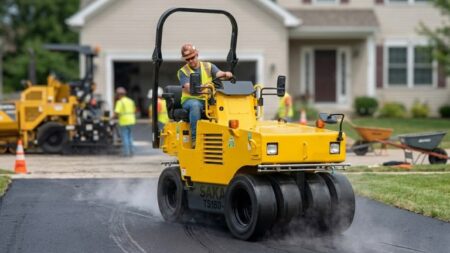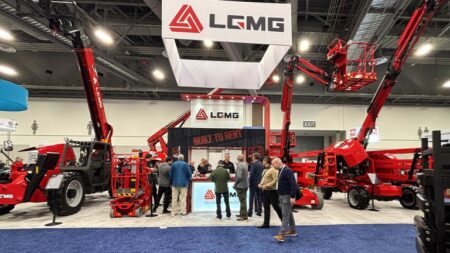Photo courtesy of Bobcat
With functionality like Bobcat MaxControl, operators can remotely operate a compatible loader using an app on an iOS smartphone or tablet. This remote operating system is especially helpful when you’re shorthanded on the job site, allowing for quick, two-person jobs to be handled by one person.
Advancements in digital technology and autonomous operations are reshaping the compact equipment industry and how work gets done.
Today, many compact construction machines and other jobsite solutions are leaving the factory equipped with wireless information systems, software and sensors designed to make man and machine more productive and efficient.
With these technologies, business owners and contractors have a variety of choices for which types of solutions they incorporate into their operations, and at what time they do so. While equipment is advancing in many areas, Bobcat sees three key areas of focus changing equipment today for the job site of the future.
Advancing Equipment Through Connectivity
Telematics, remote operating capabilities and software-as-a-service (SaaS) dealer offerings have become commonplace, and these solutions continue to improve over time.
At Bobcat Company, operator and machine connectivity is top-of-mind. This has not only pushed the company to deliver valuable, new capabilities to its customers, but also has evolved its product ecosystem
Business owners can’t be on every job site 24/7 and need an easier and more precise view of what’s going on across their operations. They want to anticipate future needs instead of reacting to current demands. Business owners are increasingly becoming more comfortable with telematics and using data to make smarter, more efficient decisions.
With advancements in telematics, like Bobcat Machine IQ, owners can track equipment performance and operator productivity. Telematics offerings vary by provider, but typically allow equipment owners and operators to manage their fleets from afar as they can receive machine data on their cellphone or computer. Owners and operators can remotely receive fault code notifications and troubleshooting guidance to minimize downtime and maximize productivity.
Telematics offerings also can make managing a fleet of connected machines much easier. Some telematics systems, like Machine IQ, allow fleet managers to track their machines’ locations, operation hours, fuel usage and other data.
Remote operation is another form of connectivity that has become an important evolution on many job sites today. With functionality like Bobcat MaxControl, operators can remotely operate a compatible loader using an app on an iOS smartphone or tablet. This remote operating system is especially helpful when you’re shorthanded on the job site, allowing for quick, two-person jobs to be handled by one person. It also helps operators avoid repeated trips in and out of the cab between one or multiple machines.
Advanced digital technologies also offer equipment owners access to new features that don’t require a trip to the dealership for installation. Owners of some compact equipment can quickly enable additional features on their machine as their job site needs change.
For example, owners of Bobcat 60- and 70-platform R-Series loaders can easily add select features to their loaders after purchase. Using an app, their dealers can quickly enable Features on Demand, including 2-speed travel, high-flow hydraulics, automatic ride control and dual-direction bucket positioning.
Offering Options With Alternative Energy
Customers today have more challenges to navigate on the job site — whether they be government-imposed mandates and regulations or working with clients focused on sustainable site work. Regardless of the reason, alternative energy solutions have become increasingly important and necessary.
Bobcat is already seeing some customers — municipalities, for example — gravitate toward adoption of electrification due to the sustainability value proposition electric machines provide. Other customers may find electric equipment offers them more jobsite versatility.
Producing no emissions, electric machines can offer labor-saving performance and tackle tough jobs on environmentally sensitive work sites or indoors where exhaust is restricted.
However, customers are discovering that these solutions offer much more than just sustainability, like the all-electric Bobcat T7X compact track loader. Operators notice the increased power, instant torque and near silent operation in a package that has 50 percent fewer parts and no hydraulic fluid — true game changers to the customers who have driven it.
Alternative energy solutions will continue to be developed alongside advancements in diesel-power technology. As long as customers face varying jobsite challenges and needs, the compact equipment industry will continue to develop a variety of jobsite solutions.
Streamlining Tasks Through Autonomous Operations
Autonomous operations may sound intimidating to some, but there are many facets of this functionality that are already built into our everyday lives even though we may not realize it. For example, if your car can auto-slow or auto-stop if you’re approaching a vehicle too quickly, that’s a form of autonomy.
Just like in automotive, an integral piece of autonomous operation is object avoidance. Bobcat recently introduced its concept collision warning and avoidance system, which is designed to assist operators’ jobsite awareness. The technology tracks an objects’ position, direction and speed relative to the machine. This functionality will be made available soon on select Bobcat compact track loader and skid-steer loader products.
Autonomous and semi-autonomous machine operations can help operators monetize output, not just a piece of equipment. This more connected performance also allows savvy business owners to estimate jobs more easily, as actual work is translated to an actual cost. This innovation also will help business owners plan with greater specificity over time since they will have historical data and trends at their fingertips.
Bobcat has several concept machines in development that leverage autonomous operation, including the autonomous zero-turn mower and the concept RogueX compact loader.
Wireless information systems, alternative energy solutions and autonomous operations can create competitive advantages to complete complex tasks efficiently, while giving operators more options for how they conduct their work. Business owners will be able to make more predictive decisions about what jobs they could take on that present real ROI opportunities for their organization. Of course, the threads that weave these capabilities altogether are connectivity.
As technology progresses, fleet owners can take advantage of autonomous equipment to complete repetitive tasks like basic material movement while reserving their skilled operators for more complex tasks. Because the need for operators — and skilled workers in general — will continue to be in high demand, equipment manufacturers are designing and building equipment that maximizes their productivity without sacrificing performance.
In addition, assigning autonomous operations to repetitive tasks could open doors to more complex jobs that may not have been a reality before.
To achieve these advancements over the next several years, a commitment to innovation and stepping into the unknown must take place today. Industry evolves due to those who continue to advance the latest technologies to address the toughest challenges. More than ever, customers expect to see new products, new components, more options and more product launches with emerging technology — and Bobcat believes that the industry will continue to meet and even exceed those demands.
Read the full article here

